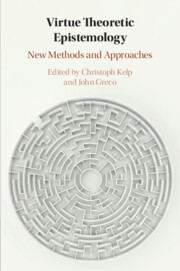Book contents
- Virtue Theoretic Epistemology
- Virtue Theoretic Epistemology
- Copyright page
- Contents
- Figures
- Contributors
- Acknowledgements
- Introduction
- Chapter 1 Closed-Mindedness As an Intellectual Vice
- Chapter 2 Epistemic Virtues and Virtues with Epistemic Content
- Chapter 3 Difficulty and Knowledge
- Chapter 4 What Is Epistemic Entitlement?
- Chapter 5 Knowledge-Producing Abilities
- Chapter 6 Virtue Epistemology, Two Kinds of Internalism, and the Intelligibility Problem
- Chapter 7 Knowledge Is Extrinsically Apt Belief
- Chapter 8 Explaining Knowledge
- Chapter 9 Anti-risk Virtue Epistemology
- Chapter 10 Responsibilism within Reason
- Index
- References
Chapter 3 - Difficulty and Knowledge
Published online by Cambridge University Press: 16 July 2020
- Virtue Theoretic Epistemology
- Virtue Theoretic Epistemology
- Copyright page
- Contents
- Figures
- Contributors
- Acknowledgements
- Introduction
- Chapter 1 Closed-Mindedness As an Intellectual Vice
- Chapter 2 Epistemic Virtues and Virtues with Epistemic Content
- Chapter 3 Difficulty and Knowledge
- Chapter 4 What Is Epistemic Entitlement?
- Chapter 5 Knowledge-Producing Abilities
- Chapter 6 Virtue Epistemology, Two Kinds of Internalism, and the Intelligibility Problem
- Chapter 7 Knowledge Is Extrinsically Apt Belief
- Chapter 8 Explaining Knowledge
- Chapter 9 Anti-risk Virtue Epistemology
- Chapter 10 Responsibilism within Reason
- Index
- References
Summary
Some things are more difficult to know than others. For example, proving the Poincaré conjecture is certainly more difficult than coming to know what does 2 + 2 equal. However, as obvious as it seems, explaining that knowledge can be difficult in familiar epistemological terms (e.g., in evidentialist or simple reliabilist terms) is less straightforward than one could initially think. The aim of the chapter is to show that virtue reliabilism (unlike virtue responsibilism) provides a promising framework for accounting for the relationship between difficulty and knowledge. However, it argues that virtue reliabilism first needs to get rid of the problematic assumption that cognitive abilities are reliable dispositions to form true beliefs in appropriate conditions. The reason is that this idea not only prevents the theory from explaining how knowledge relates to difficulty, but also renders its main tenet – the thesis that knowledge requires the manifestation of cognitive ability in appropriate conditions – false. To amend this problem, the chapter connects the virtue reliabilist framework with recent work on the notions of achievement and difficulty. It then advances a positive proposal: the view that knowledge is a special kind of challenge with varying degrees of difficulty.
- Type
- Chapter
- Information
- Virtue Theoretic EpistemologyNew Methods and Approaches, pp. 58 - 92Publisher: Cambridge University PressPrint publication year: 2020

